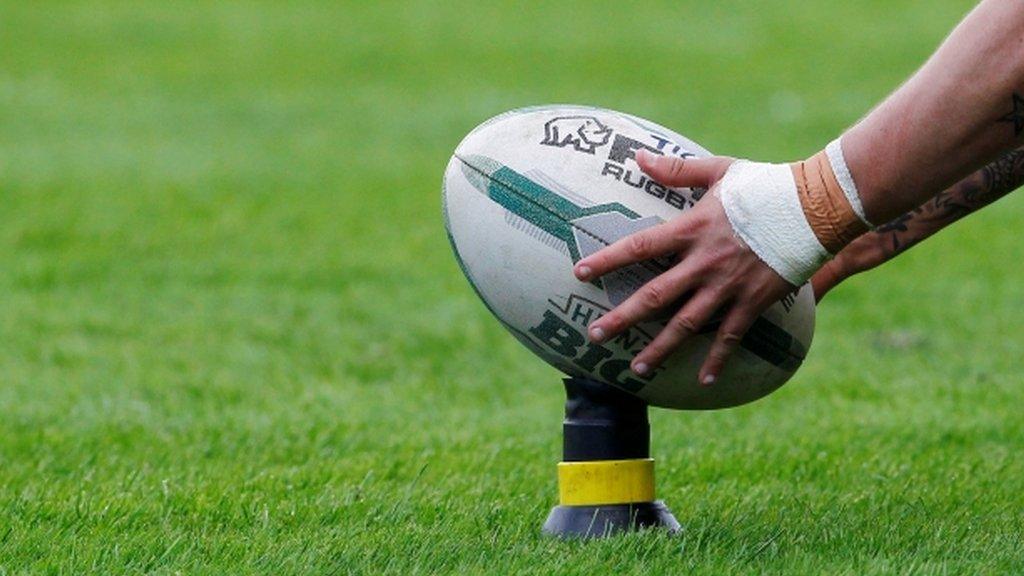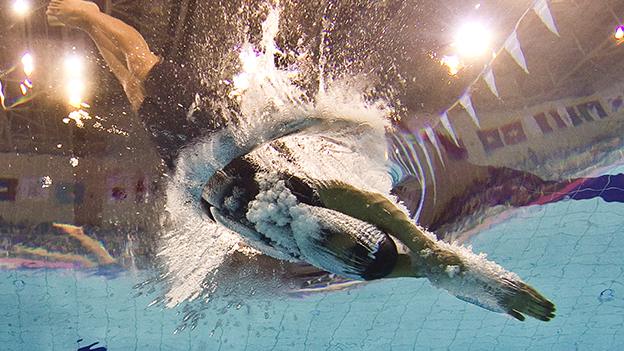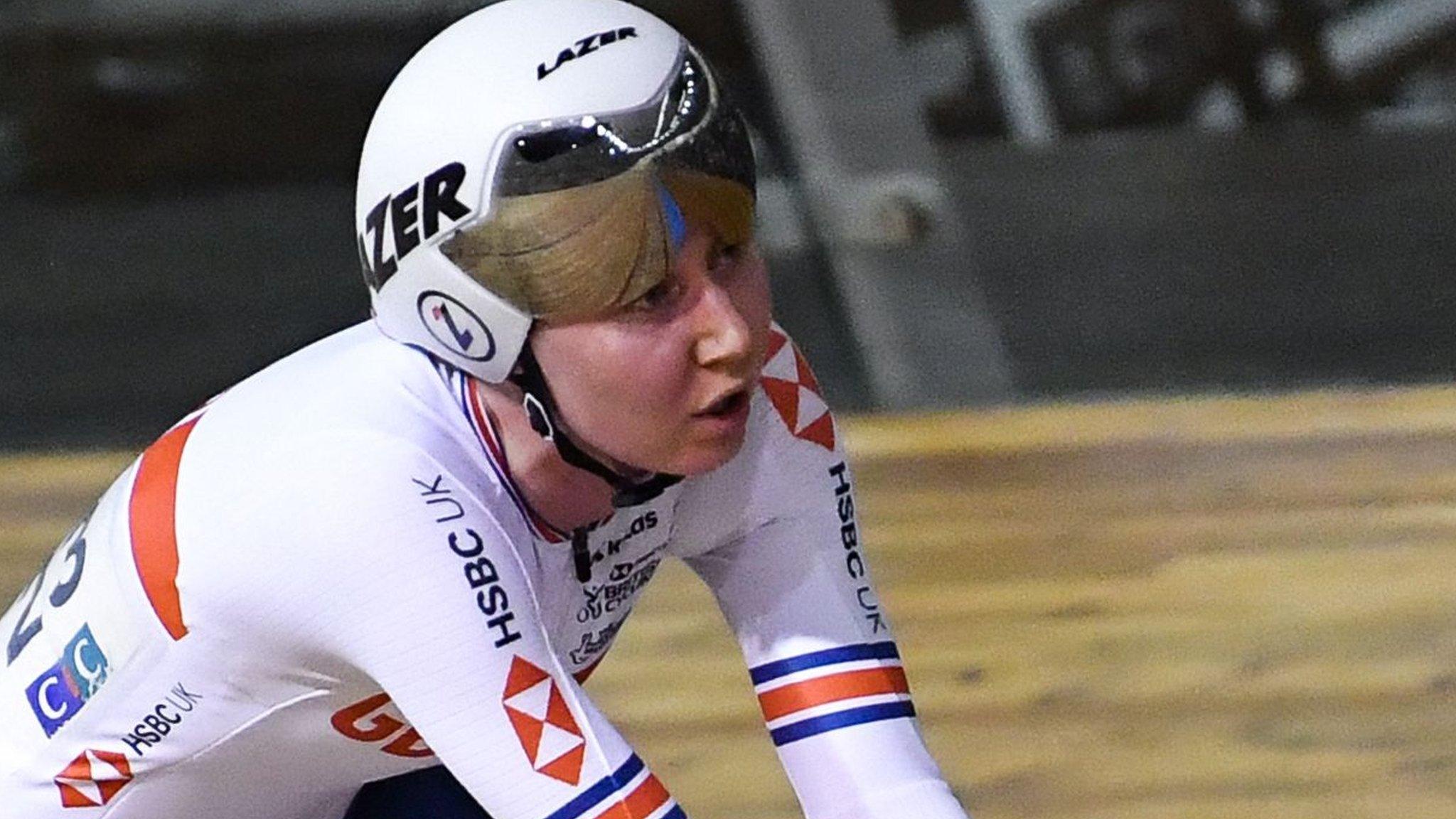Yorkshire Terriers attack 'intrusive' FA trans policy
- Published

Sam Hill, centre, said the Yorkshire Terriers will not be joining an FA league
A Yorkshire football club which includes transgender players says an "intrusive" FA policy is preventing it from joining a bigger league.
Under FA rules, trans people must seek special approval to play in its leagues.
The Yorkshire Terriers, who currently play in a mixed-gender league, claim the policy on transgender players is "exclusive, not inclusive".
The FA argues its policy helps players and ensures safety and fair play.
According to FA rules, players aged 16 and over must not play in mixed teams, while its 2014 Policy on Trans People in Football states transgender players may apply to the FA for approval to play in their "affirmed gender".
It states that each application is considered on a "case-by-case basis", and in "most cases" applications are approved.

The Yorkshire Terriers prides itself on being a LGBT friendly team
However, players need to provide medical records showing hormone levels are "within range" or that they have undergone gender reassignment surgery.
Increased levels of the hormone testosterone - responsible for muscle mass - can confer an advantage in certain sports.
Sam Hill, spokesperson for The Yorkshire Terriers, said: "For many trans people, being asked to give their medical history will be deeply traumatic. These people will have already been through a lot. They don't need to be asked to provide all this intrusive information."

Other sports
In June, Fina, swimming's world governing body, voted to stop transgender athletes from competing in women's elite races if they had gone through any part of the process of male puberty.
Former Great Britain swimmer Sharron Davies, who has argued against transgender participation in women's elite swimming, told BBC Sport she was "really proud of Fina".
However, Olympic diving champion Tom Daley said he was "furious" at the decision.
Also last month, transgender rugby league players were banned from women's internationals while the governing body carries out further research on its inclusion policy.
International Rugby League (IRL) said it wanted to "balance the individual's right to participate... against perceived risk to other participants".

Last summer another inclusive team, Manchester Laces, attacked what it called the FA's "outdated, sexist and transphobic" requirements. At the time, the FA pledged to review the policy "as part of good governance".
A year on, however, the Terriers find themselves in a similar position.
Sam added it seemed "weird" that amateur teams could not be mixed, which would negate the need to present medical evidence to the FA. They accepted, however, that this was an issue for the FA to consider.
They said: "We object to the fact that if you now identify as a man, for example, you will not be able to play in a male league without questions being asked of you and having to provide certificates to show your hormone levels.
"This is amateur-level football. No money is involved. We think you should be able to play in a team belonging to the gender you identify as."
The Leeds-based club, which prides itself on being LGBT friendly, is currently celebrating its 25th anniversary. It has about 100 players, with three transgender players regularly taking part in training sessions and matches.

The Yorkshire Terriers want to play a wider selection of teams
According to Sam, the club is "dominating" the Gay Football Supporters' Network League, leading to it considering joining the FA.
"We don't want to find ourselves saying, 'yes you can play' to one player, but 'sorry, you can't play' to another because they haven't provided 'evidence'," said Sam.
Lucy Clark, who became English football's first transgender referee in 2018, is also founder and player manager of London side TRUK United FC, which plays in an FA league and has transgender players in its squad.
She thinks the FA is right to insist on medical documentation for trans players.
"I am a real advocate for trans people playing sport," she said. "But once you are on HRT (hormone replacement therapy) there are massive changes in terms of bone density and muscle mass.
"If you're going to play competitive football, it's right and fair that boxes are ticked. I don't see a problem with that."
'Positive outcomes'
In a statement, the FA said it was "passionate" about ensuring football was accessible to all, pointing out that in addition to its 2014 policy, it had commissioned Gendered Intelligence, an organisation which specialises in trans inclusion, to "develop guidance on approaches to including trans people in football".
It added: "Our current policy-positioning has enabled positive outcomes for trans people and assisted in allowing participants to continue playing football either in their affirmed gender or in a safe and inclusive environment.
"We will continue to work with Gendered Intelligence to provide additional information to supplement our policy and related guidance, which are being reviewed."

Follow BBC Yorkshire on Facebook, external, Twitter, external and Instagram, external. Send your story ideas to yorkslincs.news@bbc.co.uk, external.
Related topics
- Attribution
- Published21 June 2022

- Attribution
- Published20 June 2022

- Attribution
- Published11 May 2022

- Attribution
- Published20 April 2022

- Attribution
- Published26 May 2022
